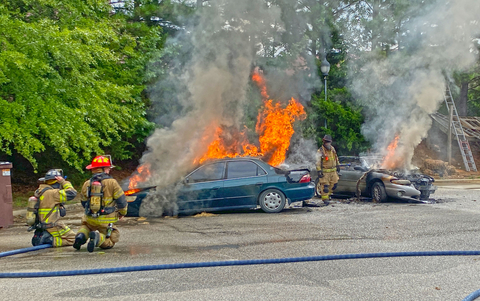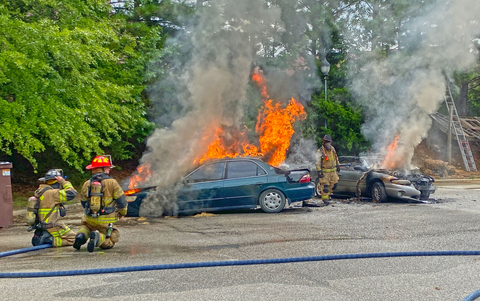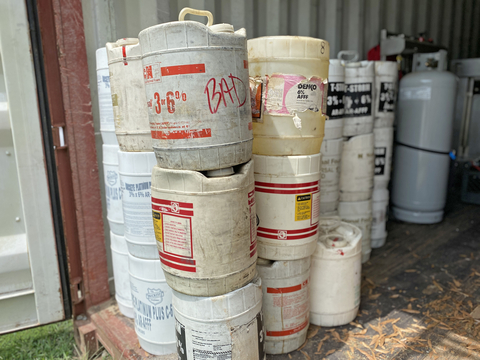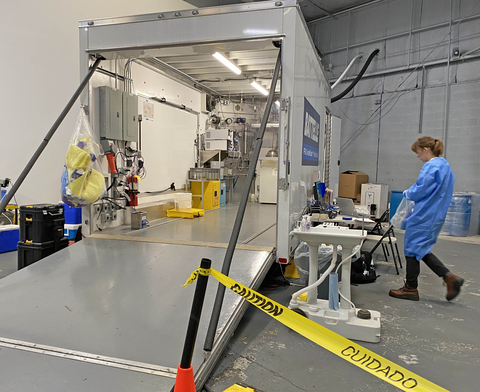COLUMBUS, Ohio--(BUSINESS WIRE)--Battelle, the world’s largest nonprofit, independent applied science and technology organization, has completed a month-long project with GreenFire leveraging Battelle’s PFAS Annihilator™ to destroy firefighting foams, which contain high levels of per- and polyfluoroalkyl substances, or PFAS.
Battelle’s PFAS Annihilator™ technology is capable of effectively destroying PFAS chemicals to non-detect levels. Under a new commercial contract with GreenFire, which produces fire defense and extinguishment products, Battelle’s PFAS Annihilator™ destroyed firefighting foam—known as Aqueous Film Forming Foam (AFFF) which contain high concentrations of PFAS. Battelle brought the PFAS Annihilator™ to the GreenFire collection site in Charlotte, N.C. to destroy stockpiled AFFF that came from several local fire houses. The PFAS Annihilator™ breaks the carbon-fluorine bond, which is the backbone of one of the most durable human-made chemicals, by adding an oxidant once in the supercritical state, then neutralizing to inert salts.
“Destroying PFAS in firefighting foams was one of our main intentions when developing the Annihilator,” said Dan Longbrake, Battelle’s Commercial Sales Director for the PFAS Annihilator™. “GreenFire reached out to us because their customers were looking for a full-circle solution in fire suppression and have been long searching for a safe and effective way to destroy their substantial stockpiles of unwanted AFFF.”
The AFFF firefighting foams have been used for decades due to their effectiveness in extinguishing petroleum-based fires, like jet fuel, because the thin film they form deprives fire of oxygen. Until recently, runoff from firefighting foams containing PFAS was not contained during training sessions or when extinguishing real fires, allowing the chemicals to seep into soil and groundwater.
Recent research shows PFAS pose serious health risks and are now being phased out of use. Many states and the U.S. Department of Defense recently banned disposing of AFFF through incineration. That means fire stations, airports, and military bases in communities across the country following the draft EPA waste disposal guidance for PFAS have stockpiled their PFAS-containing AFFF.
First responders have expressed the need for effective solutions that don’t pose health and environmental threats. GreenFire identified Battelle’s PFAS Annihilator™ as an ideal opportunity to demonstrate to customers, regulators, public officials, and firefighters that in addition to offering a PFAS-free foam, there also exists a destruction solution for AFFF that totally destroys PFAS.
“We’ve had some of this foam sitting there for more than 40 years with no safe way to dispose of it,” said Waxhaw (NC) Fire Department Chief, Gregory Sharpe. “Right now, there are approximately 200 gallons in our stockpile. When I got a call about this new solution to safely and affordably get rid of our PFAS foam and replace it with new eco-friendly foam, I jumped on it immediately.”
GreenFire CEO, Brandon Miller, said that when discussing alternatives to PFAS-based firefighting foams with his customers, they always ask about what to do with their existing stockpiles. “Fire departments have vast stockpiles of PFAS-laden foam they need to properly dispose of and replace with an effective, non-toxic foam,” Miller said. “Through our contract with Battelle, we are now able to offer a unique full-circle solution that safely and effectively addresses both of those needs.”
In 2021, the U.S. Environmental Protection Agency (EPA) identified more than 120,000 U.S. locations where people may be exposed to PFAS and just recently issued updated health advisories for PFAS; more regulatory pronouncements are expected this year. The PFAS are ubiquitous in the U.S. and around the globe, and most people have them in their bodies and blood. Exposure to PFAS is linked to infertility, thyroid problems, and several types of cancer.
While there are currently no federally-enforced, science-based standards to regulate PFAS, the EPA released a PFAS Strategic Roadmap in Oct. 2021, which outlines a timeline by which the Agency plans to take specific actions and commit to bolder new policies to safeguard public health, protect the environment, and hold polluters accountable. EPA announced in last August that it plans to designate two PFAS chemicals as hazardous substances.
Earlier this year, Battelle deployed their PFAS Annihilator™—the first-to-market total solution for PFAS removal and destruction—for a week-long pilot demonstration at a wastewater treatment facility in western Michigan. The mobile supercritical water oxidation (SCWO) technology was used to effectively destroy PFAS in landfill leachate at the site. Battelle is currently fabricating a larger mobile unit with ten times the capacity to be in the field in 2023.
“We’ve had a successful engagement in destroying PFAS in landfill leachate,” said Longbrake. “And now we’ve proven destruction of PFAS in firefighting foam.”
To learn more about the Battelle PFAS Annihilator Mobile Unit, visit our website: https://www.battelle.org/markets/environment/investigation-remediation/pfas-assessment-mitigation/pfas-annihilator-destruction-technology.
To learn more about GreenFire’s non-toxic firefighting foams and their unique full circle solution in collaboration with Battelle, visit: https://www.gogreenfire.com.
View and download additional media assets from the project, including b-roll, photos, a fact sheet and more, here: https://battelle.box.com/s/qonyqe3yge7jctpewc94593ocx8epo90.
About Battelle
Every day, the people of Battelle apply science and technology to solving what matters most. At major technology centers and national laboratories around the world, Battelle conducts research and development, designs and manufactures products, and delivers critical services for government and commercial customers. Headquartered in Columbus, Ohio since its founding in 1929, Battelle serves the national security, health and life sciences, and energy and environmental industries. For more information, visit www.battelle.org.






